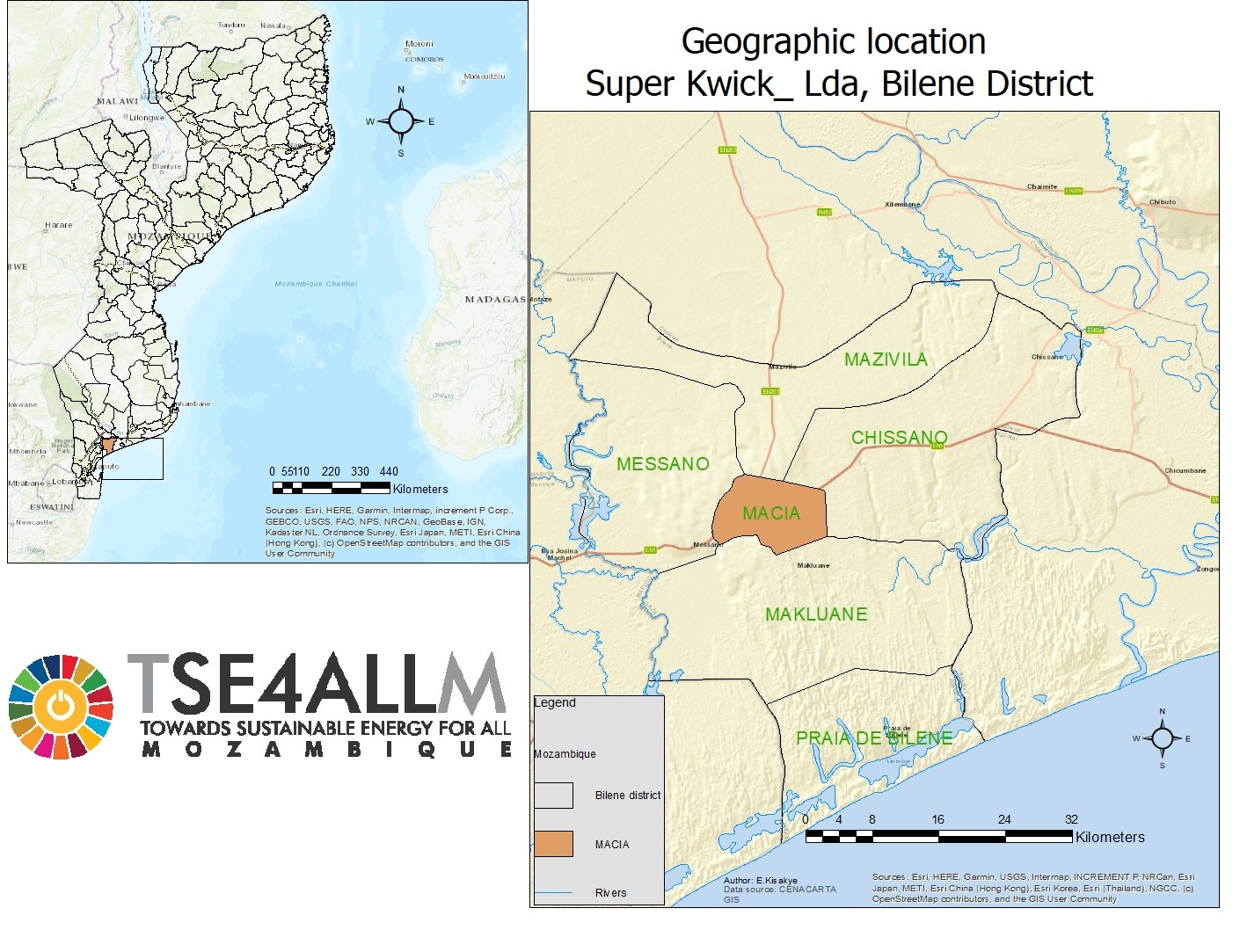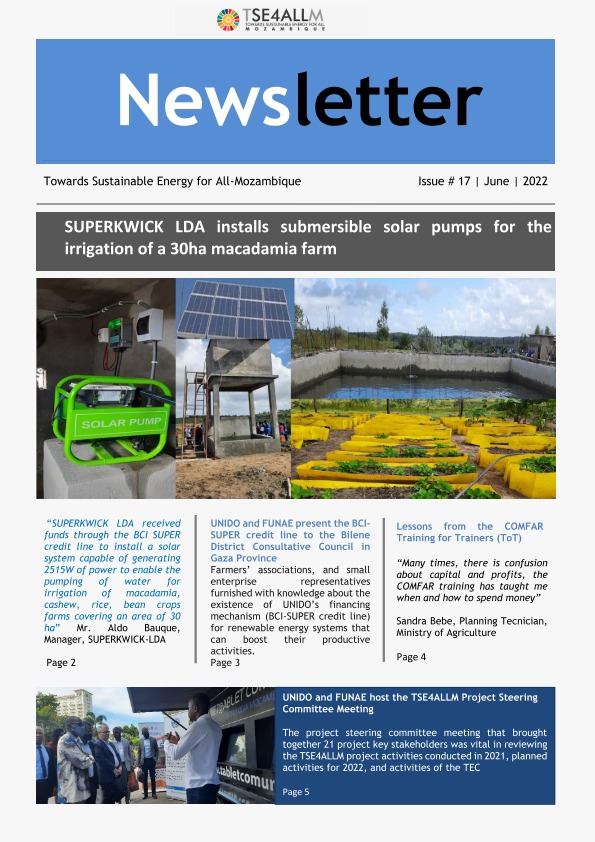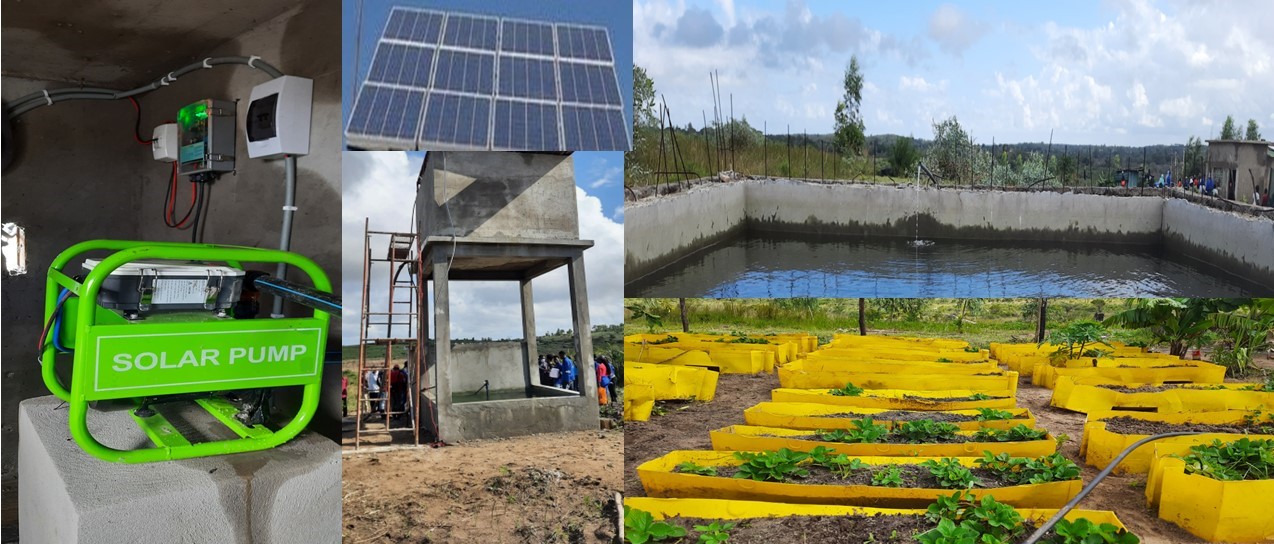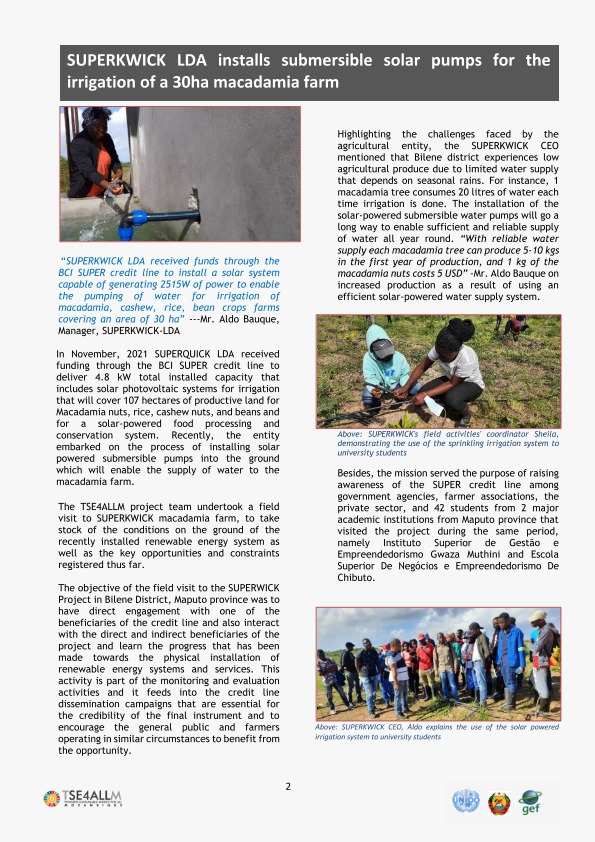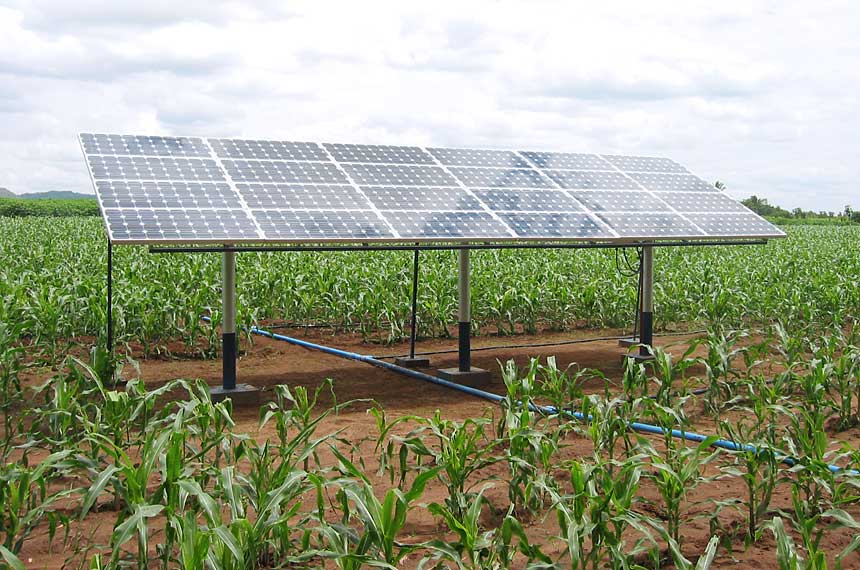
90% of Mozambican rural population depends on agriculture for their livelihoods. The methods used for cultivation are in most cases rudimental and do not yield sufficient produce for income generation and subsistence consumption.
UNIDO through the Towards Sustainable Energy for All in Mozambique (TSE4ALLM) project works towards promoting the dissemination of integrated renewable energy systems (RE) in a market-based approach for productive activities in rural areas of Mozambique
SUPERKWICK LDA cultivates a wide range of crops including macadamia, cashew, beans, and vegetables on a 10ha farm in Macia Bilene, in Mozambique. The company received funds through the BCI SUPER credit line and recently installed a solar system capable of generating 2515W of power to enable the pumping of water for irrigation of macadamia, cashew, rice, bean crops farms
“1 macadamia tree consumes 20 litres of water per day. The installation of the solar-powered submersible water pumps enables sufficient and reliable supply of water all year round” ---Aldo Bauque
In this article Miss Sheila Macia, SUPERKWICK’s field activities’ coordinator explains how the sprinkler irrigation system powered by solar energy is used.
What is the Sprinkler irrigation system?
Sprinkler irrigation is a method of applying irrigation water which is similar to natural rainfall. Water is distributed through a system of pipes usually by pumping. It is then sprayed into the air through sprinklers so that it breaks up into small water drops which fall to the ground.
Sprinklers are small sized emitters that distribute water in the form of rain with a 90% efficiency rate. “We use the micro-sprinkler irrigation system for irrigating the macadamia plants and this is determined by the hydric needs of each plant, which is 20 litres per day” Since the system requires high and continuous power supply to enable the pumping of water which is consequently sprayed to the entire field, solar energy was found to be the most efficient and reliable source of energy for this purpose.1 hectare of macadamia orchard contains 300 trees. The spacing used is 8*4m (8 metres between plants and 4 metres between rows). Each row contains 12 trees and 1 hectare contains 25 rows. The number of rows to be watered varies according to the pressure and slope of the land. But on average at least 6 rows are watered simultaneously
Mounting of the irrigation system using micro sprinklers
The assembling of the system is done according to the orientation of the land as well as the water source. To assemble the system, pipes, emitters, sprinkler heads, valves, and reduction joints are the materials needed.
Advantages of the sprinkler irrigation system
The Sprinkler Irrigation Systems ensures reliability, uniform distribution of water with high efficiency, high quality, affordability, ease of installation and maximum water saving. Besides, it is affordable and completely easy to set up. There is no need of spending much on labor costs for setting it up. In addition, Soluble fertilizers, herbicides and fungicides can be added in water before distributing to the crops.
What are the challenges of using the sprinkler irrigation system?
Despite the enormous advantages, using the sprinkler irrigation system also comes with some challenges. The initial cost of setting up the system is high, the water must be clean and free of sand, debris and dissolve salts, and, it cannot be used in windy climate. In addition, Fruits/crops/vegetables can be damaged due to excessive water, and requires high and continuous power supply.
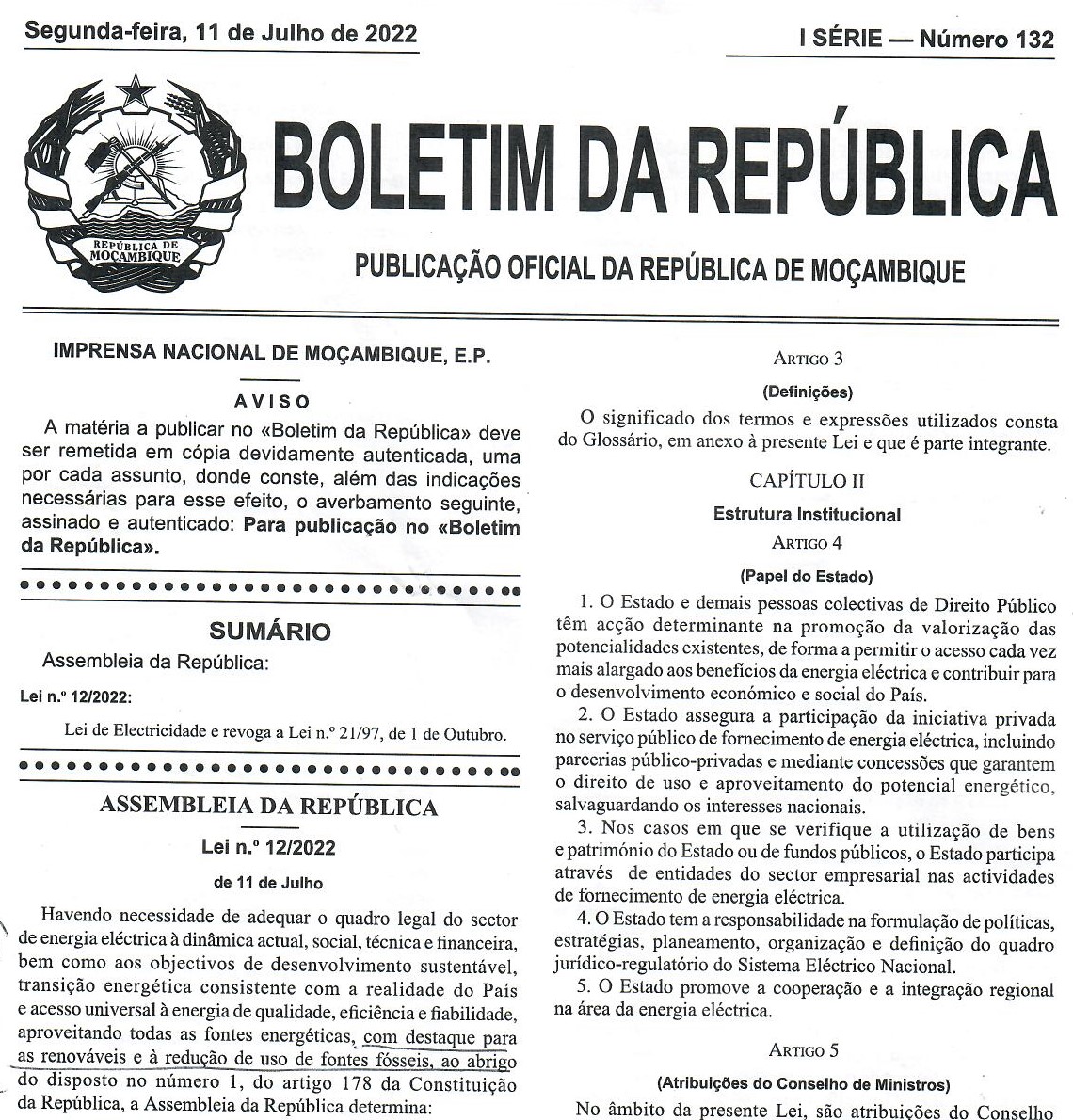
In 2021, the rural electricity access rate was estimated at about 8%, against 72% in urban areas of Mozambique. Whereas The country aims to achieve universal electricity access by 2030, energy access remains low with significant rural-urban disparities. Recognizing the need to adapt the legal framework of the electricity sector to the current social, technical and financial dynamics, as well as to the objectives of sustainable development, the Parliament in a plenary session on 30th March, 2022 approved the coming into force of the Electricity Law.
On 11th July, 2022, Law No 12/2022 was published following its enactment by President Filipe Nyusi. The purpose of this law is to define the general organization of the of the electric power sector and the legal regime of the activities of the supply of electrical energy. Most importantly, the new law underscores energy transition consistent with the reality of the country and universal access to quality, efficient and reliable energy, taking advantage of all energy sources, with emphasis on renewable energy sources and the reduction in the use of fossil sources.
The legislation governs the operation of the electric power system and general rules applicable to the production, transmission, distribution and sales activities, including imports and exports, with a view to providing more citizens with access to electricity. The new further, makes room for private investment in the import and export of electricity, electricity consumption, and energy services.
The Towards Sustainable Energy for All- Mozambique (TSE4ALLM) project applauds the government’s bold decision to enact and publish the new Electricity Law as step toward ensuring universal access to electricity by 2030. The project continues to support the market-based adoption of integrated renewable energy systems by advocating for a conducive policy and regulatory environment that promotes the involvement of the private sector in the development of integrated Renewable Energy systems for rural areas of Mozambique.

The TSE4ALLM project national project coordinator presenting the BCI SUPER credit line to the Bilene District Council
Bilene district is located in the Gaza Province in south-western Mozambique with Macia as its principal town. According to the 2011 census (National Institute of Statistics), Bilene district has a population of about 161,000 inhabitants, divided into six administrative posts namely, Incaia, Macia, Macuane, Mazivila, Messano, and Praia do Bilene and presents a higher proportion of women (55.3%). The population is essentially young, with 77.5% of the inhabitants in the age group below 36 years old. Most of the population of this district (76.4%) resides in rural areas.

Above: A market in Macia town where most farmers sell their produce
Agriculture is one of the district’s main economic activities and there are 30,000 farms occupying averagely 1.5 hectares (0.0058 sq mi) of land. The main agricultural products are maize, cassava, cowpeas, peanuts, and sweet potatoes. Data from the 2011 census indicates that 42% of the district population uses open-pipe wells without pumps as a source of water and only 14% of households have access to electricity. 66.5% of households use Petrol/Paraffin/Kerosene as their main source of energy.
Limited access to energy and inadequate water supply are major barriers to the development of the district since all economic activities including agriculture depend on the availability of these two important resources. “There is too much work in our fields which requires water yet due to climate change it is very hard to experience consistent rains throughout the year. Access to technology like solar powered- solar pumps with less dependence on seasonal rains is a very vital solution to the challenges we face” --- Mr. Pelembe, representative of Bilene farmers at the District Council.

The TSE4ALLM National Project coordinator and FUNAE representative present the BCI SUPER credit line to the Bilene District Administrator
The local government structure is composed of the District Consultative Council (CCD) which is the community channel that coordinates dialogue between the government and the community. It is the most important accountability platform formed by members from all territorial areas belonging to the district.
The TSE4ALLM project with the representation of UNIDO and FUNAE participated in the Bilene District Consultative Council session which was held on 18th May, 2022 at the district headquarters conference hall. The meeting brought together 32 participants (of which 40% are women) including 6 administrative posts chiefs, youth representatives, agricultural associations, cooperatives, SME representatives, and the district economic services department.
The participatory space enabled the sharing of information related to the opportunities and challenges both economic and social impacting the development of the district. “We have large farms for agriculture and other economic activities like fish farming, cattle raring, piggery, and poultry. However, we have very few people interested in agriculture and this limits produce. Young people need to be motivated to engage in the agricultural sector through modern agricultural methods” ---Mr. Matias Albino Parruque, Bilene District Administrator

Individual farmers, their associations, and small enterprise representatives were furnished with knowledge about the existence of UNIDO’s financing mechanism (BCI-SUPER credit line) for renewable energy systems that can boost their productive activities. “There are many financial instruments in the market but the BCI SUPER credit line is unique given its special features like the 7.5% interest rate, focus on renewable energy systems for productive uses, and technical support of entities in the drafting of bankable projects”-Mr. Vicente Matsinhe, National Project Coordinator, TSE4ALLM.
The success of SUPERKWICK LDA, a Bilene based entity that received a low interest rate loan for the installation of a solar-powered irrigation system in the cultivation of 10 ha of land serves as an enormous incentive for other farmers to adhere to the credit scheme. “SUPERKWICK LDA received funds through the BCI SUPER credit line to install a solar system capable of generating 2515W of power to enable the pumping of water for irrigation of macadamia, cashew, rice, bean crops farms covering an area of 30 ha” ---Mr. Aldo Bauque, Manager, SUPERKWICK-LDA

Above: SUPERKWICK proprietor, Aldo Bauque, explaining to university students about the solar-powered irrigation system used to water the macadamia plants
In the same meeting, various renewable energy technologies eligible for funding through the BCI SUPER credit line were highlighted including, solar systems for water pumping and irrigation; photovoltaic solar systems for productive purposes in the commercial sector; water supply systems; transformation of organic waste into energy; Biomass utilization systems for biogas production; and, systems for harnessing biomass for electricity production.
“The fact that communities in Bilene are engaged in activities like cattle raring, piggery, poultry, and agriculture which produce large amounts of waste is an opportunity for the district to generate energy with the waste (biomass) with the aim of replacing the other forms of energy generation that are more costly and detrimental to the environment”- Mr. Fernando Namburete, the FUNAE representative.
